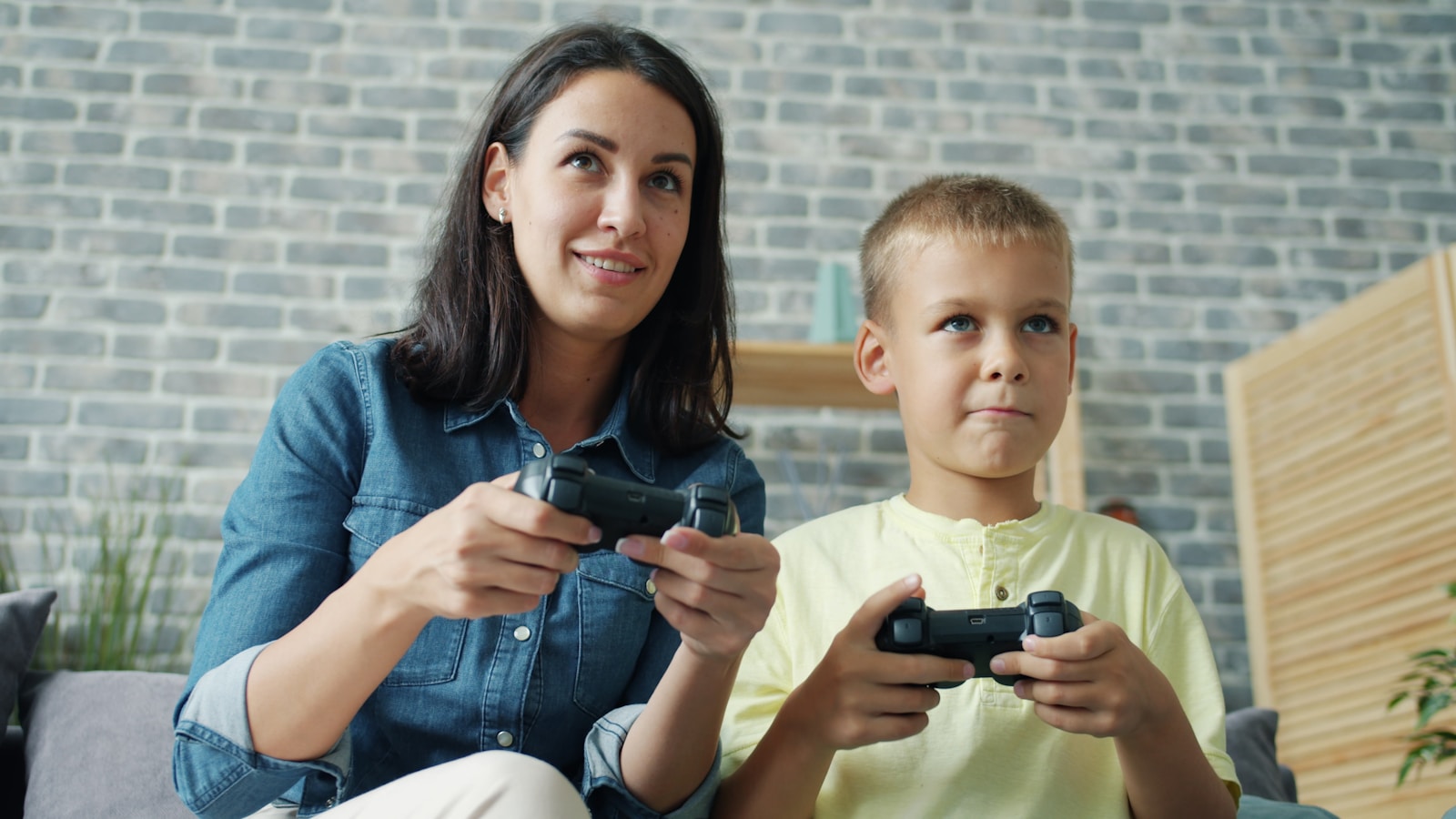Modern gaming culture encompasses complex social interactions, creative expression, and community building that extends far beyond traditional entertainment, requiring parents to understand new social norms and communication patterns. Research from the Pew Research Center shows that 97% of teens play video games, with 83% considering gaming a primary social activity, while 76% report making lasting friendships through gaming communities that provide emotional support and social connection.
1. Social Interaction and Community Dynamics
1.1 Online Friendships and Relationship Building
Gaming platforms enable children to form genuine friendships with peers worldwide through shared experiences, cooperation, and regular communication. These relationships often provide emotional support and social learning opportunities comparable to in-person friendships.
1.2 Communication Methods and Platform Integration
Modern gaming involves complex communication through voice chat, text messaging, streaming platforms, and social media that create interconnected social networks. Understanding these communication channels helps parents monitor and support healthy social interaction.
1.3 Guild and Team Dynamics
Gaming guilds and teams function as organized social groups with leadership structures, responsibilities, and collaborative goals that teach social skills and provide belonging. These groups often have more complex social dynamics than traditional extracurricular activities.
1.4 Cross-Generational Gaming and Family Opportunities
Gaming provides unique opportunities for family bonding across age groups through shared activities and interests that traditional media cannot offer. Many families discover improved communication and connection through gaming together.
2. Creative Expression and Digital Literacy Development
2.1 User-Generated Content and Creative Platforms
Games like Minecraft, Roblox, and LittleBigPlanet enable children to create complex digital content including architecture, art, music, and interactive experiences that develop technical and creative skills valuable for future careers.
2.2 Streaming and Content Creation Culture
Many young gamers create streaming content, YouTube videos, and social media around gaming that develops presentation skills, technical knowledge, and audience engagement abilities while exploring potential career paths.
2.3 Modding and Programming Introduction
Gaming communities often involve modifying games or creating custom content that introduces programming concepts, digital design, and technical problem-solving in engaging, practical contexts.
2.4 Digital Art and Design Skills
Gaming environments encourage digital art creation, character design, and aesthetic development that build valuable technical skills while providing creative outlets for artistic expression and experimentation.
3. Economic Understanding and Digital Commerce
3.1 Virtual Economies and Financial Literacy
Gaming exposes children to complex economic concepts through virtual markets, trading, and resource management that can teach financial literacy and economic principles in practical contexts.
3.2 Microtransactions and Spending Awareness
Modern gaming includes various spending options that require teaching children about digital commerce, value assessment, and responsible spending habits within gaming environments and beyond.
3.3 Career Opportunities and Professional Gaming
Gaming industry careers extend far beyond professional playing to include design, programming, marketing, content creation, and business management, representing legitimate career paths requiring various skills and education.
3.4 Entrepreneurship and Business Development
Some children develop entrepreneurial skills through gaming-related businesses like content creation, coaching, or virtual item trading that teach business principles and income generation.
4. Learning and Educational Integration
4.1 Problem-Solving and Critical Thinking
Gaming develops analytical thinking, strategic planning, and creative problem-solving abilities that transfer to academic subjects and real-world challenges. Many games require complex reasoning and systematic thinking.
4.2 Collaboration and Leadership Skills
Multiplayer gaming teaches cooperation, communication, and leadership through team coordination and group problem-solving that develops social and professional skills valuable throughout life.
4.3 Technology Fluency and Digital Skills
Gaming develops comfort with technology interfaces, software navigation, and digital communication that provides advantages in increasingly technology-dependent educational and professional environments.
4.4 Subject-Specific Learning Opportunities
Educational games and gamified learning platforms make academic subjects more engaging while providing interactive ways to practice skills and explore concepts in science, history, mathematics, and language arts.
5. Safety Concerns and Protection Strategies
5.1 Online Safety and Stranger Interaction
Gaming platforms require teaching children about appropriate online behavior, personal information protection, and recognizing potentially harmful interactions while maintaining social benefits of gaming communities.
5.2 Content Appropriateness and Rating Systems
Understanding game rating systems (ESRB) and content descriptors helps parents make informed decisions about age-appropriate games while considering individual maturity levels and family values.
5.3 Screen Time Balance and Health Considerations
Gaming requires balance with physical activity, sleep, academic responsibilities, and face-to-face social interaction to maintain overall health and development while enjoying gaming benefits.
5.4 Cyberbullying and Negative Interaction Management
Teaching children to recognize and respond to cyberbullying, toxic behavior, and negative gaming experiences while maintaining positive community engagement and emotional resilience.
6. Communication and Relationship Building
6.1 Gaming Language and Culture Understanding
Learning gaming terminology, cultural references, and communication norms helps parents understand their children’s experiences and maintain relevant conversations about gaming interests and activities.
6.2 Shared Interest Development
Parents can build stronger relationships with gaming children by showing interest in their games, asking questions about experiences, and occasionally participating in age-appropriate gaming activities together.
6.3 Conflict Resolution and Rule Setting
Establishing clear expectations about gaming time, behavior, and priorities while involving children in rule creation helps prevent conflicts and builds mutual respect around gaming habits.
6.4 Achievement Recognition and Support
Recognizing gaming accomplishments and skills while connecting them to broader life skills and goals helps children understand the value of their gaming experiences and interests.
7. Future Preparation and Skill Development
7.1 Career Path Exploration
Gaming interests can lead to careers in technology, design, entertainment, business, and other fields. Supporting children’s gaming interests while encouraging broader skill development prepares them for diverse career opportunities.
7.2 Social Skill Transfer and Real-World Application
Helping children recognize how gaming social skills, leadership experience, and problem-solving abilities apply to school, work, and personal relationships maximizes the developmental benefits of gaming experiences.
7.3 Technology Adaptation and Future Readiness
Gaming experience provides comfort with rapidly changing technology that prepares children for future educational and professional environments that increasingly rely on digital fluency and adaptability.
7.4 Global Awareness and Cultural Understanding
International gaming communities expose children to diverse cultures, languages, and perspectives that build global awareness and cultural sensitivity valuable in increasingly connected world environments.
Conclusion
Understanding modern gaming culture requires recognizing that gaming has evolved into a complex social, creative, and educational environment that provides valuable developmental opportunities alongside traditional entertainment. Parents who approach gaming with curiosity and openness can better support their children’s development while addressing legitimate safety and balance concerns. The key lies in maintaining communication, setting appropriate boundaries, and recognizing gaming’s potential benefits while ensuring it complements rather than replaces other important life activities and relationships. Modern gaming culture offers unique opportunities for learning, creativity, and social connection that, when properly understood and guided, can contribute positively to children’s development and family relationships.











